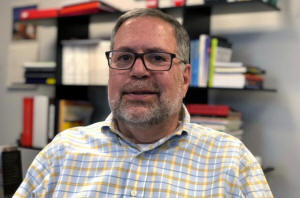|
As
states chase sports betting gold, addicts left in the cold
 Send a link to a friend
Send a link to a friend
 [October 26, 2018]
By Laila Kearney [October 26, 2018]
By Laila Kearney
NEW YORK (Reuters) - On the day Jeff
Wasserman's decades-long gambling addiction came to a head, the
Delaware lawyer found himself parked outside a convenience store
with three agonizing options: end his life, flee the country or come
clean and get help.
"I raised the white flag in my own mind," Wasserman, 63, said of the
day he decided to seek help for a problem that had secretly consumed
hundreds of thousands of dollars, his retirement savings and his
career. "I knew that it was D-day."
Wasserman is now more than three years into his recovery, which
started with a phone call to Delaware's anti-gambling addiction
program.
It is one of a growing number of publicly-funded programs that face
a financial crunch as U.S. states jump at the chance to collect
revenue through legal sports betting, while largely ignoring the
need to spend more tackling gambling addiction.
Of the eight U.S. states that legalized full-scale sports betting,
only three have increased funding for problem gambling services. And
the contributions have been small, according to state officials and
program directors.

None of those states, or the additional 15 and the District of
Columbia that introduced bills in 2018 to legalize sports betting,
have followed the National Council on Problem Gambling (NCPG)
recommendation to dedicate 1 percent of legal sports betting revenue
to problem gambling services.
New Jersey, where legal sports betting activity has taken off since
it began in June, comes the closest.
For a graphic on State of play for legal sports betting in U.S.
states, see - https://tmsnrt.rs/2O4FxHo
FIGHTING FOR FUNDING
Pennsylvania and Rhode Island have increased gambling addiction
funds. But only by 0.2 percent of sports wagering gross revenue for
Pennsylvania and an annual bump of $25,000, for the nation's
smallest state, state officials said.
The remaining five - Mississippi, West Virginia, Nevada, New York
and Delaware - have not yet agreed to add funds to addiction
programs.
Delaware was the first state to launch full-scale legal sports
betting after the U.S. Supreme Court lifted a ban on the practice in
May. The state's anti-gambling addiction program is fighting for
more money.
"We're going to have to be treating more people. We'll have to
expand our prevention advertising, and we can't do that with the
funding we currently receive," said Arlene Simon, who runs the
Delaware Council on Gambling Problems.
In Nevada, which has long had legal sports betting and roughly six
percent of the population is addicted to gaming, more addiction
treatment centers are expected to apply for public funds next year
on top of the current seven, said Kim Garcia, who leads the Nevada
Problem Gambling Program. However, there is no planned increase to
the program's $1.2 million annual budget, Garcia said.

Problem gamblers in Mississippi, which recently launched both sports
betting and approved a state lottery, may soon find themselves
without options for help.
Funding for the Mississippi Council on Problem and Compulsive
Gambling was left out of the state's new gambling legislation. A 40
percent budget deficit puts it on course to close its doors within
two years, said program director Betty Greer.
The state's gambling services provider, which once offered free
counseling sessions, has been whittled down to a helpline that
operates on $100,000 a year, Greer said.
[to top of second column] |

Jeff Wasserman, a recovering gambling addict poses at the Delaware
Council on Gambling Problems in Wilmington, Delaware, U.S., October
23, 2018. REUTERS/Mike Wood

The launch of legal sports betting is an important time for states
to dedicate funds to counteract gambling's negative impacts, said
Oregon-based Jeff Marotta, whose company, Problem Gambling
Solutions, conducts the National Survey of Problem Gambling
Services.
"Bills can be written in a way that set up all kinds of
protections," Marotta said. "I don't think enough people think about
that."
STATES SEE UPSIDE, NOT PROBLEM
Gambling addiction, which affects a little more than two percent of
the U.S. population, has attracted far less attention than drug,
tobacco and alcohol addictions.
U.S. public funding for substance abuse treatments is 334 times
larger than for all gambling addiction services, but those problems
are only 3.8 times more common, according to the 2016 gambling
addiction services survey. That imbalance is likely to grow with a
renewed focus on the nation's opioid crisis.
The estimated social costs of problem gambling are about $6.5
billion per year, with criminal justice and health costs making up
the bulk of spending.
Still, states tend to focus on the upside of gambling, said NCPG
Executive Director Keith Whyte.
"Most states that do have legalized gambling see it primarily as a
revenue source, a jobs generator, rather than as a public health
issue," Whyte said.
The American Psychiatric Association only started listing problem
gambling as a behavioral addiction alongside drug abuse in its
manual that classifies mental disorders in 2013. Previously, it was
categorized alongside impulse-control disorders, such as kleptomania
and compulsive shopping.
The reclassification could lead to a shift in public sentiment and
possibly more long-term funding for gambling addiction, Whyte said.

Wasserman, who now does judicial outreach for the Delaware Council
on Gambling Problems, only realized his problem was a bona fide
addiction after starting treatment. That is not unusual, experts
said.
That was the case for West Virginia carpenter Marshal Verzich, who
also reached out for help with a 13-year addiction to slot machines
on the day he contemplated suicide.
"The sense of remorse at that moment was so great that I didn't see
any reason to go on," Verzich said of the February 2015 day he left
his local Charles Town casino after spending 18 hours and more than
$1,000 on slots.
Instead, Verzich's wife talked him into calling the state's gambling
addiction hotline for help. Through that service, Verzich attended a
support group retreat for recovering gambling addicts and their
families.
"That was the first time I had heard from other people with the same
problem that I had. People don't realize that it's a disease."
(Reporting by Laila Kearney; Editing by Daniel Bases and Bill
Berkrot)
[© 2018 Thomson Reuters. All rights
reserved.] Copyright 2018 Reuters. All rights reserved. This material may not be published,
broadcast, rewritten or redistributed.
Thompson Reuters is solely responsible for this content. |